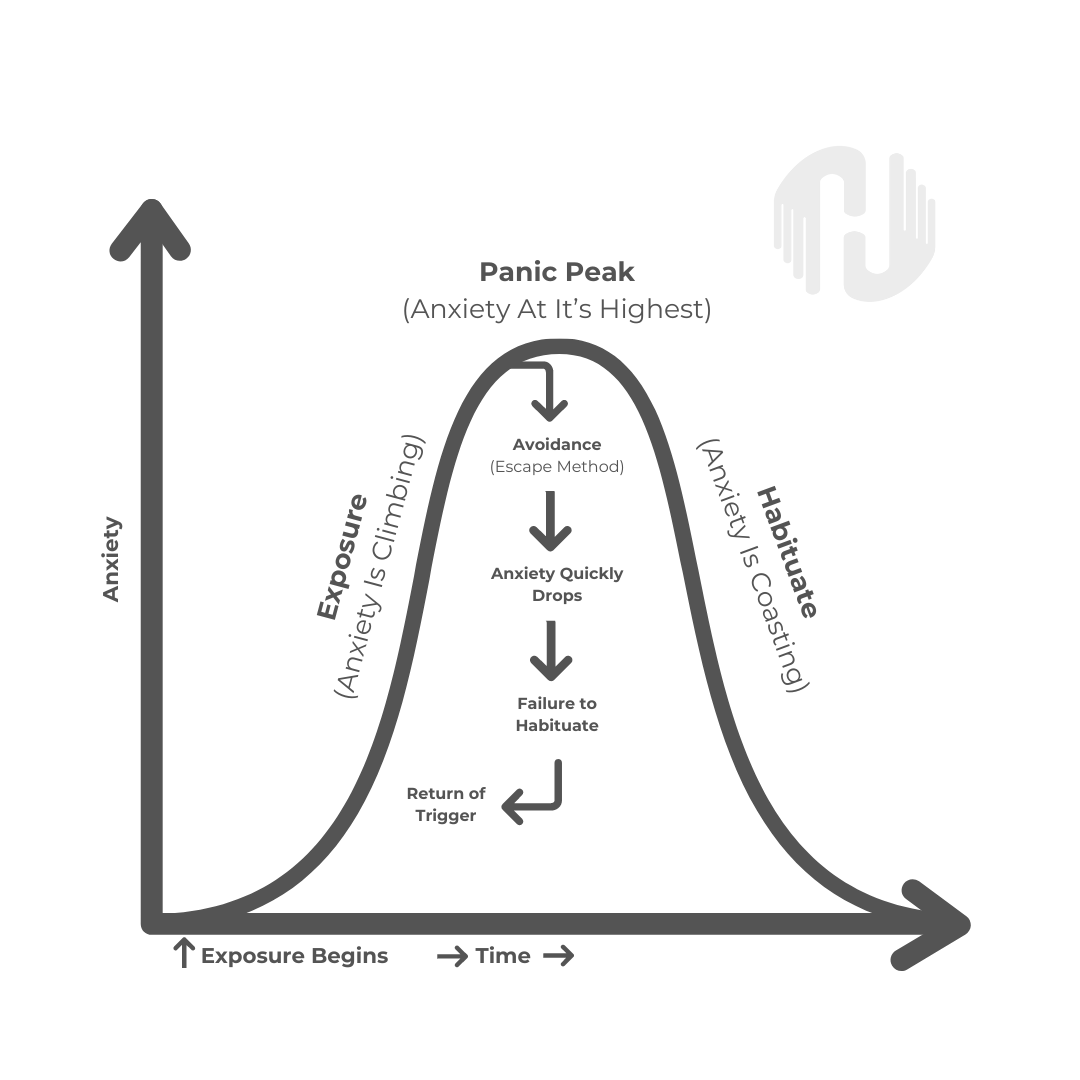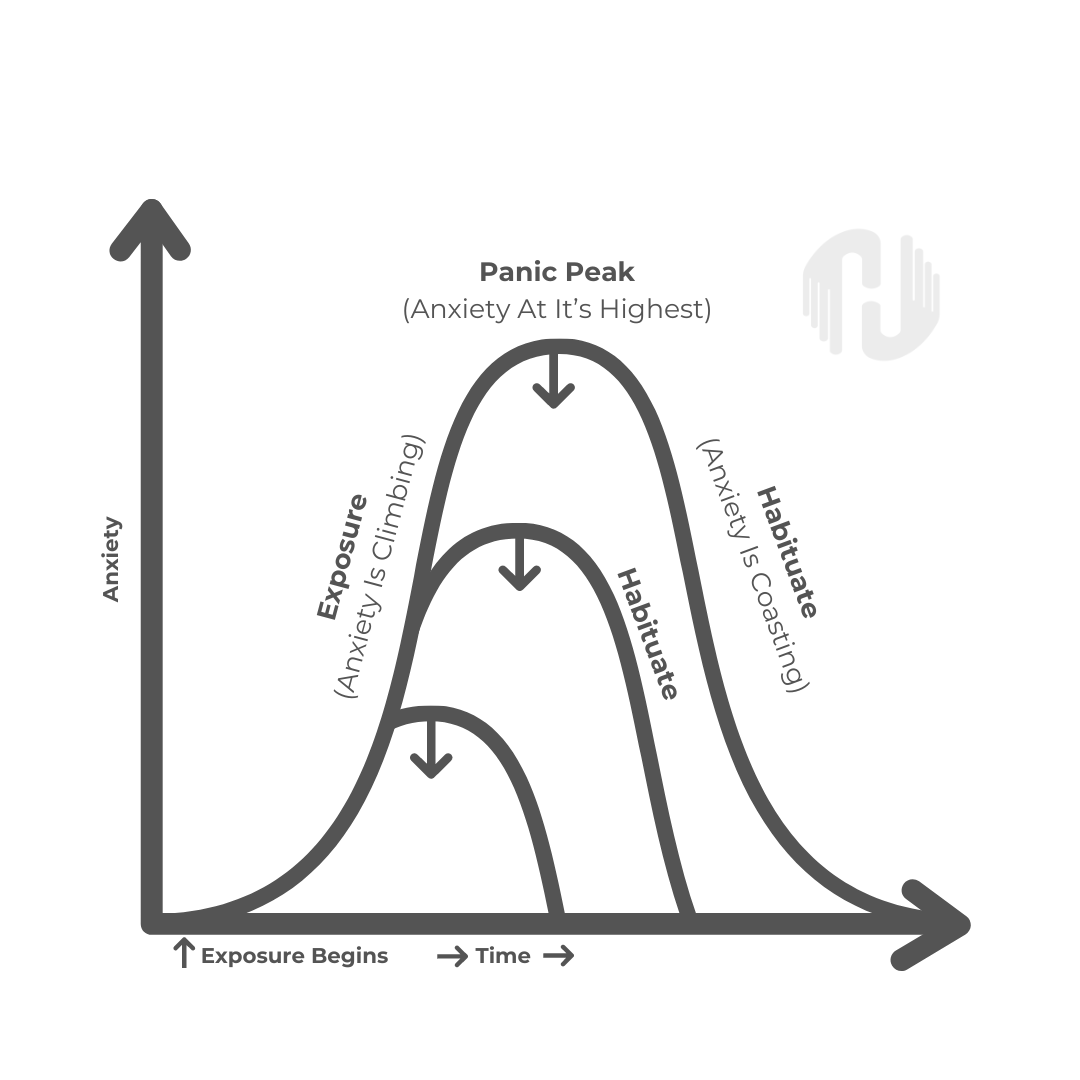Breathing Easier: Transform Anxiety into Achievement
Anxiety is a familiar sensation for many, often manifesting as a racing heartbeat before pivotal moments, like a presentation at work or school, or as sweaty palms when faced with unexpected challenges. However, for some, anxiety goes beyond these occasional outbreaks; it becomes a relentless force that darkens every aspect of their lives, significantly diminishing their overall quality of life. Imagine, though, if there were a method not merely to lessen but to fundamentally decrease the impact of anxiety by confronting rather than avoiding its triggers. This is where the concept of habituation steps in. Offering more than temporary relief, habituation charts a course towards sustained resilience and emotional stability, equipping us to handle the inevitable tough times. By deliberately facing our fears, we can gradually lessen our reaction to anxiety-producing situations, transforming overwhelming anxieties into manageable parts of daily life. This proactive approach can soothe immediate symptoms and foster a deep, enduring sense of empowerment.
If you would like to find out if you are experiencing the symptoms of anxiety, you can take the online anxiety test to find out for sure and ways that you can start work to find the relief from anxiety you deserve.
Habituation and Its Role in Treating Anxiety
Introduction to Habituation
Let's explore the concept of habituation—a therapeutic technique designed to empower you to confront your anxiety directly. This method utilizes the principle of controlled, repeated exposure to the sources of your anxiety, enabling you to face these triggers intentionally, safely, and purposefully.
Working alongside a trained professional therapist, each exposure session is carefully tailored to stay within your comfort zone while gradually extending its boundaries. This precise adjustment ensures that you can progressively handle more, setting the stage for a gradual reduction in the intensity of your fear responses. As you consistently confront the sources of your anxiety and fear in a supportive environment, you not only diminish the distressing emotions but also build strong confidence to manage stress more effectively across various areas of your life.
Habituation involves more than just getting used to anxiety triggers; it's about transforming how you react to them. This transformation fosters resilience, allowing you to regain control over your emotional health. Through habituation, you learn to break down the fear instilled by anxiety, replacing it with empowerment and a refreshed sense of personal agency. This journey transcends merely coping with distress—it's about thriving through mastery and achieving emotional liberation.
Definition and Basic Principles
Let’s explore habituation more deeply. Imagine stepping into a chilly swimming pool: the initial shock sends a shiver through your body, tempting you to get out. However, if you remain, your body adjusts, and what was once piercingly cold becomes surprisingly bearable, even enjoyable. This scenario is similar to the therapeutic application of habituation, particularly in treating anxiety. The American Psychological Association defines habituation as becoming so familiar with a stimulus that it loses its initial emotional impact.
In a therapeutic setting, this involves systematically confronting the triggers of your anxiety—be it the intense fear of public speaking, the dread of flying, or more subtle triggers like navigating complex social dynamics or routine tasks. Each controlled exposure to these triggers gradually diminishes their distressing effects. Through this process, you learn to understand and deconstruct the fear they invoke. This repeated exposure reduces the emotional weight of these triggers, transforming them from sources of distress into manageable challenges.
This practice progressively loosens the tight grip of anxiety on your life, enabling you to regain your autonomy. Habituation is not about suppressing your fears but integrating them into the fabric of your life, allowing you to face anxiety-inducing situations with calm instead of apprehension. It turns what were once overwhelming obstacles into manageable, everyday tasks.
Habituation is especially powerful because it represents more than just a coping mechanism—it is a route to profound change. In a secure and supportive therapeutic environment, repeatedly confronting your fears alters their essence: they become less daunting and simply another part of your life's landscape. This transformation isn't about enduring hardship; it's a deep, psychological shift that makes the previously unbearable become tolerable—and ultimately, neutral.
How Habituation Can Be Applied in Anxiety Treatment
Imagine a world where your fears no longer dictate your actions—a place where you can fully engage in the activities you love, unburdened by the constant shadow of anxiety. This vision can become your reality through the transformative process of habituation. This approach does more than confront fears; it deconstructs them, uncovers their origins, and teaches you to manage the intense emotions they evoke. Each exposure session is a purposeful step toward building resilience and transforming intimidating obstacles into manageable tasks.
As you courageously face these fears repeatedly, their hold on you diminishes while you simultaneously develop a robust arsenal of coping strategies. This process is not just therapeutic; it's a profound journey of self-discovery. Isn't this a journey worth embarking on? Take, for example, someone who fears public speaking. They might begin by imagining giving a lecture, progress to speaking in front of a small group, and eventually address a full auditorium. Each step is meticulously crafted to gradually reduce their fear, empowering them to cope and excel in the spotlight and master their reactions to stressful situations. Through habituation, daunting tasks become opportunities for personal growth and mastery, reshaping your emotional landscape with resilience.
Beyond Therapy: Habituation in Daily Life
The principles of habituation extend beyond the confines of a therapist’s office; they permeate every aspect of our daily lives, profoundly shaping our interactions and relationships. Over time, the vivid details of our surroundings and the unique traits of our loved ones gradually recede into the background. The perfume that once captivated us with each spray may soon become unnoticeable, and the charming quirks that initially drew us to our partner may lose their allure.
This gradual numbing of our senses and emotions is a byproduct of our brain's quest for efficiency—it helps us navigate life without being overwhelmed by continuous stimuli, freeing us to focus on new experiences and the present moment. However, this process has its drawbacks: the rich connections and joys that once brightened our world may dim over time.
Recognizing this natural tendency, we can proactively keep our relationships vibrant and meaningful. We can inject new life into old friendships and deepen connections with our partners, ensuring the initial spark of joy and affection is maintained and rekindled. This deliberate re-engagement revitalizes our appreciation for well-known pleasures and protects against the apathy that familiarity can breed, keeping our emotional lives enriched and dynamic.
Revitalizing Relationships Through Habituation
While habituation helps us handle overwhelming sensations, it can ironically make us less attuned to what we enjoy and what we may identify as positives in our lives. This is especially true in close relationships, where the initial excitement often fades into routine familiarity. Over time, this familiarity can lead to complacency, and we begin to overlook the meaningful ways our partners contribute to our lives.
However, understanding habituation offers a chance to revitalize these relationships. By actively applying its principles, we can refocus and start to appreciate our loved ones' everyday contributions anew. This could involve spontaneous acts of kindness, trying new activities together, or expressing gratitude daily.
Such deliberate actions can profoundly change the nature of a relationship. They remind us of the reasons we first fell in love and help deepen our connections. By countering habituation's dulling effects, we can reignite the joy in our relationships and ensure that familiarity brings contentment, not discontent.
What’s Next
Habituation is more than just a coping strategy; it's a transformative approach that fundamentally changes how we handle our fears and interact with the world. This method goes beyond mere survival—it helps us thrive. By adopting habituation, you can move from a life overshadowed by anxiety to one filled with newfound control and confidence. This process transforms daily anxieties into opportunities for growth, empowering you to take charge of your life. Are you ready to embark on this transformation journey and take control of your experiences? Let's discover how habituation can illuminate your path to personal empowerment and enduring peace. Reach out to us at Horn Counseling, and we'll help connect you with a therapist in your area.
Actionable Steps
Here are some actionable steps to apply the principles of habituation in your daily life, particularly to manage anxiety and enhance emotional well-being. Along with these steps, you can download our free Exposure Hierarchy Worksheet that will help you practice facing your anxieties in a healthy way to practice the principles of habituation.
Identify Your Triggers: Identify specific situations or stimuli that trigger your anxiety. These could be public speaking, social gatherings, or even specific work tasks.
Start Small: Choose a relatively mild anxiety trigger to start with. You want to set yourself up for success by gradually exposing yourself to fear in a controlled and manageable way.
Plan Your Exposure: Develop a step-by-step plan for exposure. For example, if you're anxious about public speaking, start by speaking to yourself in the mirror, then progress to speaking in front of a friend, and slowly increase the audience size over time.
Create a Supportive Environment: Make sure you undertake this process in a safe and supportive environment. This might mean having a trusted friend or therapist guide you through the exposure steps or choosing a comfortable setting to face your fears.
Practice Regularly: Consistency is critical in habituation. Schedule regular sessions where you expose yourself to the anxiety trigger. A therapist can guide the frequency of these sessions to ensure they fit your personal resilience and capacity.
Reflect on Your Experiences: After each exposure session, take some time to reflect on what you felt and how you reacted. This can help you understand your progress and prepare for future sessions.
Celebrate Small Victories: Recognizing and celebrating each step forward is crucial. This helps build confidence and reinforces the positive impact of your efforts.
Adjust as Needed: If a particular step feels too overwhelming, adjusting your approach is okay. Maybe you need to break the steps down even further, or perhaps you need more time on a previous step.
Expand Your Horizons: As you become comfortable with one trigger, begin applying the same principles to other triggers. Each success builds more resilience and confidence.
Seek Professional Guidance: While self-help approaches can be effective, professional guidance from a therapist trained in exposure therapy or similar techniques can provide additional support and structure, especially for severe anxiety.
Integrate Coping Strategies: Alongside exposure, integrate other anxiety management techniques such as mindfulness, deep breathing, or cognitive restructuring to help manage your reactions during exposure sessions.
Monitor Long-Term Progress: Keep an ongoing journal or log of your anxiety levels and triggers over time. This can provide valuable insights into how well the habituation process is working and whether adjustments are needed.
By actively engaging with your fears through controlled exposure and using these steps as a guide, you can gradually diminish the power that anxiety holds over you, leading to a more empowered and fulfilling life.
References
Diagnostic and Statistical Manual of Mental Disorders, Fifth Edition
National Institute of Mental Health
Anxiety and Depression Association of America (ADAA)
"Exposure Therapy for Anxiety: Principles and Practice" by Jonathan S. Abramowitz, Brett J. Deacon, Stephen P. H. Whiteside
"The Efficacy of Habituation Training in Treating Disseminated Physiological Anxiety" Journal of Anxiety Disorders, 2019
"The Impact of Avoidance Behavior on Anxiety: A Meta-Analytic Review" Psychological Bulletin



